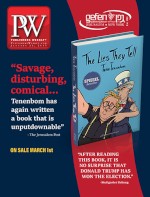At only 37 years old, Isaac Lidsky has already had several remarkable and remarkably successful careers. He began in acting—his first role, at six months old, was in a diaper commercial, but his big break came in 1993 when he was cast as Weasel in Saved by the Bell: The New Class. That was also the year he was diagnosed with a degenerative disease that ultimately led him to completely lose his sight a decade later.
Meanwhile, Lidsky didn’t feel at home in celebrity culture. He left L.A. to attend Harvard, graduating at 19 in 1999. Then he went on to Harvard Law School. The apex of his career in law was his time serving as a clerk for U.S. Supreme Court justices Sandra Day O’Connor and Ruth Bader Ginsburg; he is the only blind person ever to serve in this capacity. But the legal work he landed in after that didn’t feel right either.
After some soul searching and career counseling, Lidsky figured out that he was best suited to the challenges of a CEO role. So, with the help of a good college friend, Lidsky bought Orlando Decorative Concrete, a small Florida-based construction company, and quickly turned it into a hugely successful enterprise using the problem-solving skills he’d been developing.
Lidsky did all of this—and got married and became a father of four—while progressively losing his sight and adapting to the tremendous challenges blindness presented him with. In Eyes Wide Open, Lidsky shares his story and his strategies for seeing reality clearly and taking responsibility for one’s life by acknowledging that, blind or not, we create what we see from within. He talked with PW about his life and his book.
Why did you write this book, and whom do you feel will benefit most from it?
When I was diagnosed with my blinding disease, I believed blindness would ruin my life. I was very wrong. I lost my sight, but I gained the eyes-wide-open vision to define and create the life I want for myself, the life I live today. Losing my sight turned out to be a profound blessing. I wrote the book to share with others the vision I gained with blindness so that they, too, can choose to live and lead eyes-wide-open, choose to see what I see.
Do you have a piece of concise advice for someone eager to change their overall attitude toward life who doesn’t know where to start?
It starts with honest introspection; we do ourselves great harm when we lie to ourselves. What are the differences between the way you want to live your life and the way you actually live it—the differences in terms of who you are, your career, how you treat others, how you allow others to treat you, how you spend your time, what you accomplish? Are you willing to take responsibility for those differences and do something about them? You must hold yourself accountable for your answers. Once you commit to the idea that you alone bear responsibility for your life, in every moment, the rest is straightforward.
Is there someone in your life you view as a model of living “eyes-wide-open”?
That’s easy: Justice O’Connor. She is one of the most remarkable people I’ve ever met. It was an honor to work for her and to gain her as a mentor in my life. I have learned countless invaluable lessons from her. She embodies the very ideal of integrity—conforming your actions to your values. I think of her often when facing difficult decisions.
At only 37, you’ve already achieved so much. How was writing a book different? Why was this the right time to do it?
I’ve thought about these ideas for more than 20 years now. As my vision gained clarity, and impact in my life, the urge to share it with others grew steadily in me. I relived much of my life while writing—the pain, joy, love, fear, struggle, and triumph. At the same time, I became accountable for who I am and how I live my life to a far greater extent and with greater precision—accountable to myself, and to the people in my life who will eventually read the book.



 Volume 264
Issue 04
01/23/2017
Volume 264
Issue 04
01/23/2017






